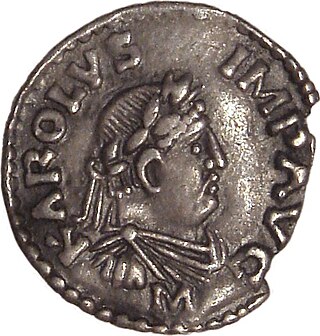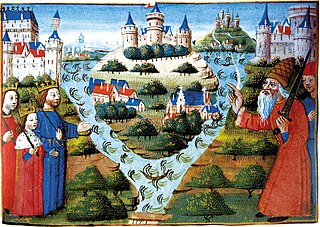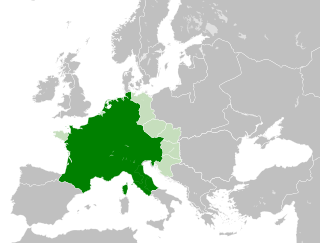Related Research Articles

Charlemagne was King of the Franks from 768, King of the Lombards from 774, and Emperor of what is now known as the Carolingian Empire from 800, holding these titles until his death in 814. He united most of Western and Central Europe, and was the first recognised emperor to rule from the west after the fall of the Western Roman Empire approximately three centuries earlier. Charlemagne's reign was marked by political and social changes that had lasting influence on Europe throughout the Middle Ages.

Louis the Pious, also called the Fair and the Debonaire, was King of the Franks and co-emperor with his father, Charlemagne, from 813. He was also King of Aquitaine from 781. As the only surviving son of Charlemagne and Hildegard, he became the sole ruler of the Franks after his father's death in 814, a position that he held until his death except from November 833 to March 834, when he was deposed.

The Treaty of Verdun, agreed in 10 August 843, divided the Frankish Empire into three kingdoms between Lothair I, Louis II and Charles II, the surviving sons of the emperor Louis I, the son and successor of Charlemagne. The treaty was concluded following almost three years of civil war and was the culmination of negotiations lasting more than a year. It was the first in a series of partitions contributing to the dissolution of the empire created by Charlemagne and has been seen as foreshadowing the formation of many of the modern countries of western Europe.

The Carolingian Empire (800–887) was a Frankish-dominated empire in Western and Central Europe during the Early Middle Ages. It was ruled by the Carolingian dynasty, which had ruled as kings of the Franks since 751 and as kings of the Lombards in Italy from 774. In 800, the Frankish king Charlemagne was crowned emperor in Rome by Pope Leo III in an effort to transfer the status of Roman Empire from the Byzantine Empire to Western Europe. The Carolingian Empire is sometimes considered the first phase in the history of the Holy Roman Empire.
Pepin I or Pippin I may refer to:
Pepin II or Pippin II may refer to:

The Carolingian dynasty was a Frankish noble family named after Charles Martel and his grandson Charlemagne, descendants of the Arnulfing and Pippinid clans of the 7th century AD. The dynasty consolidated its power in the 8th century, eventually making the offices of mayor of the palace and dux et princeps Francorum hereditary, and becoming the de facto rulers of the Franks as the real powers behind the Merovingian throne. In 751 the Merovingian dynasty which had ruled the Franks was overthrown with the consent of the Papacy and the aristocracy, and Pepin the Short, son of Martel, was crowned King of the Franks. The Carolingian dynasty reached its peak in 800 with the crowning of Charlemagne as the first Emperor of the Romans in the West in over three centuries. Nearly every monarch of France from Charlemagne's son Louis the Pious until the penultimate monarch of France Louis Philippe have been his descendants. His death in 814 began an extended period of fragmentation of the Carolingian Empire and decline that would eventually lead to the evolution of the Kingdom of France and the Holy Roman Empire.

Lothair I was a 9th-century Carolingian emperor and king of Italy (818–855) and Middle Francia (843–855).

The Kingdom of the Franks, also known as the Frankish Kingdom, the Frankish Empire or Francia, was the largest post-Roman barbarian kingdom in Western Europe. It was ruled by the Frankish Merovingian and Carolingian dynasties during the Early Middle Ages. Francia was among the last surviving Germanic kingdoms from the Migration Period era.

Pepin or Pippin, was King of Italy from 781 until his death in 810. He was the third son of Charlemagne. Upon his baptism in 781, Carloman was renamed Pepin, where he was also crowned as king of the Lombard Kingdom his father had conquered. Pepin ruled the kingdom from a young age under Charlemagne, but predeceased his father. His son Bernard was named king of Italy after him, and his descendants were the longest-surviving direct male line of the Carolingian dynasty.

Bernard was the illegitimate son of Pepin of Italy from 810 to 818. He plotted against his uncle, Emperor Louis the Pious, when the latter's Ordinatio Imperii made Bernard a vassal of his cousin Lothair. When his plot was discovered, Louis had him blinded, a procedure which killed him.

Pepin the Short, was King of the Franks from 751 until his death in 768. He was the first Carolingian to become king.
Herbert I or Heribertus I, Count of Vermandois, Count of Soissons, and lay abbot of Saint Quentin and Saint-Crépin. He was a Carolingian aristocrat who played a significant role in Francia.
Pepin I was Count of Vermandois, lord of Senlis, Péronne and Saint Quentin. He was son of King Bernard of Italy and his wife, Cunigunda of Laon. He supported Emperor Lothar after the death of Emperor Louis the Pious, despite having sworn allegiance to Charles the Bald.

Saint Fulrad was a French religious leader who was the Abbot of Saint-Denis. He was the counselor of both Pepin the Short and Charlemagne. Historians see Fulrad as important due to his significance in the rise of the Frankish Kingdom, and the insight he gives into early Carolingian society. He was noted to have been always on the side of Charlemagne, especially during the attack from the Saxons on Regnum Francorum, and the Royal Mandatum. Other historians have taken a closer look at Fulrad's interactions with the papacy. When Fulrad was the counselor of Pepin he was closely in contact with the papacy to gain approval for Pepin's appointment as King of the Franks. During his time under Charlemagne, he had dealings with the papacy again for different reasons. When he became Abbot of Saint-Denis in the mid-eighth century, Fulrad became important in the lives of distinct historical figures in various ways. Saint Fulrad's Feast Day is on 16 July.
Pepin, or Pippin the Hunchback was a Frankish prince. He was the eldest son of Charlemagne and noblewoman Himiltrude. He developed a humped back after birth, leading early medieval historians to give him the epithet "hunchback". He lived with his father's court after Charlemagne dismissed his mother and married Desiderata. Around 781, Pepin's half brother Carloman was rechristened as "Pepin of Italy"—a step that may have signaled Charlemagne's decision to disinherit the elder Pepin, for a variety of possible reasons. In 792, Pepin the Hunchback revolted against his father with a group of leading Frankish nobles, but the plot was discovered and put down before the conspiracy could be put into action. Charlemagne commuted Pepin's death sentence, having him tonsured and exiled to the monastery of Prüm instead. Since his death in 811, Pepin has been the subject of numerous works of historical fiction.
Pippin or Pepin may refer to:
Pepin II (845–893) was a Frankish count. He was a son of Pepin, Count of Vermandois and Valois and thus a grandson of Bernard of Italy, who was himself a grandson of Charlemagne. He was the Count of Senlis and Count of Vermandois ; Lord of Valois, and later Count of Valois. The brothers of Pepin III were Herbert I, Count of Vermandois and Bernard II, Count of Laon.
Bernard I of Senlis was a Frankish noble from Herbertien dynasty, a branch of Carolingian dynasty. He was a descendant of Charlemagne and his son Pepin of Italy. He was a cousin of Herbert I, Count of Vermandois.